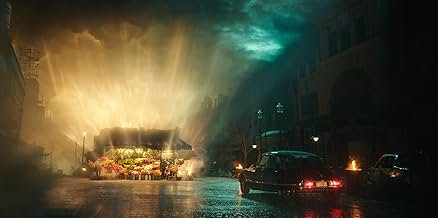Un architetto vuole ricostruire utopicamente New York a seguito di un disastro devastante.Un architetto vuole ricostruire utopicamente New York a seguito di un disastro devastante.Un architetto vuole ricostruire utopicamente New York a seguito di un disastro devastante.
- Regia
- Sceneggiatura
- Star
- Premi
- 3 vittorie e 18 candidature totali
- Huey Wilkes
- (as Bailey Ives)
Riepilogo
Recensioni in evidenza
That said, it is natural to be skeptical of what is essentially an admiring biopic of Robert Moses. Especially when it has apparently been written by Ayn Rand as a reply to METROPOLIS and then handed to Abel Gance after convincing him he's making a movie about Julius Caesar instead of Napoleon. And don't forget the quotations from Marcus Aurelius.
It is, in sum, a very learned movie. To appreciate the details, you need to have read extensively in Roman history, seen a lot of silent films, and be familiar with New York City in the second half of the 20th Century, including the flight of the middle and upper classes from the 1950s through the 1980s. Through the vagaries of my upbringing and a chaotic course of self-education, I can claim those things. So. What do I think?
The performances are fine. However, I am left with the question, as I am about so many movies these days, of who Coppola made this movie for. It is claimed he spent about $140 million of his own money on this feature. The general rule is that a movie has to gross about twice its production cost to break even. I can't see a large enough audience for this to produce $300,000,000 in tickets and secondary rights. It is simply too long, a shaggy dog story about love and artistic vision being more important than anything else.
This would not, of course, be the first time that Coppola has let his artistic ambitions explode on him; even though it is claimed APOCALYPSE NOW eventually made its money back, I have my doubts about that if you add in interest costs. Certainly ONE FROM THE HEART was a disaster, and he spent a couple of decades making nicely commercial movies from other sources to dig his way out, and let the wineries and restaurants make him money. Neither do I believe this movie will ruin him. There are certainly enough movies buffs around to make the net loss from this bearable.
All of which goes a long way to answering my question of who Coppola's intended audience was. It was Coppola himself, an attempt to prove himself the complete film maker, instead of the fine translator of others' well told tales. I hope he likes what he has wrought.
The plot follows the genius scientist Cesar, inventor of the revolutionary material "Megalon," with which he plans to build a utopian city of the future-"Megalopolis." This is one of the film's central themes-obsession with perfection in a world and society far from it. Envy, jealousy, greed, and the lust for power are other themes that shape the essence of this work. Coppola doesn't shy away from weaving in political commentary as well as reflections on human existence.
When I reflect on the film's themes, one might think this is a good film. On the contrary, all of these themes are destroyed by narrative chaos, which in my opinion stems from the director's pretentious ambition to present an unprecedented 'megalomaniac' work of art. The editing and narrative are disjointed-the film jumps from scene to scene with no coherence, which became tiresome after just fifteen minutes. By the midpoint, I had completely lost interest in the story and was simply waiting for it to end.
Even though most of the cast is well-known, it's difficult to connect with any of the characters-most are shallow, and some are entirely unnecessary. The only character I connected with was Cesar, thanks to Adam Driver's brilliant performance. His ability to convey Cesar's mania, dialogue, and emotions is likely the reason I stayed engaged at all, rather than the depth of the character itself. The dialogue is mixed-sometimes brilliant, sometimes dull-which made the experience quite uneven.
The cinematography is excellent, and had Coppola focused primarily on this element, this could have been an extraordinary film.
In conclusion, I can say that due to its impressive cinematography, I can't consider "Megalopolis" a bad film, but because of its awful narrative structure, I also can't recommend it to anyone. It's disjointed, unsure of which themes to focus on, and unclear about what it truly wants to convey. Uncertain in its very purpose.
It's challenging to understand what Coppola's intention was with this film. It seems like he chose not to focus too much on characters but rather on themes. However, some scenes suggest that the audience should feel empathy for the characters, but one simply can't. One reason for that is the pacing of this film; it somehow manages to be fast, yet feel slow, and that might be because some scenes are dull. If we remove all the misleading character development, we are left with misleading idea development. Megalopolis bombards you with interesting ideas, but because there are quite a few of them, none of them evolves into a solid conclusion. As I already mentioned, it's hard to see where Coppola was going with all of this.
If his intention was to go against the classical narrative structure and challenge viewers with a different type of storytelling, then that didn't work either. Some scenes contain clichés, and the overall structure feels like a mix of 50s to 90s scenery. One interesting thing the movie does frequently is plant a seed that sometimes does not grow-it stays in that scene, and then we move to the next one. This method of storytelling is misleading and confusing for most audiences, and it probably would work better if this technique had a solid foundation throughout the whole film. But it simply does not feel right.
David Lynch once said that you can make any film, any art the way you want, as long as it feels right. His films are stranger and more difficult to understand than Megalopolis, yet when you watch Lynch's work, you don't feel misled-everything feels right, no matter how strange it is. Megalopolis sometimes feels right, sometimes it doesn't.
Megalopolis is a good example of how the director's stylistic touch matters to the look of the movie. The cinematography of this film was done by the same person who shot The Master. Yet this film feels like any expensive commercial shot today-too vivid, too warm, too basic.
I will definitely rewatch this film in the future, all jokes aside. This film has a shtick to it that I didn't quite get the first time watching. Overall, it's a bit sad that this is Coppola's last film, but I'm sure he has no regrets making it. After all, this is the guy who made Apocalypse Now, and I will respect him forever for his contribution to American cinema.
Lo sapevi?
- QuizFrancis Ford Coppola wrote the script in the early 1980s, but the film was kept on the back-burner partially due to his financial debts. Pre-production finally began in 2001 after filming 30 hours of second unit footage and holding table read with Paul Newman, Uma Thurman, Robert De Niro, James Gandolfini, Nicolas Cage, Leonardo DiCaprio, Russell Crowe, Edie Falco, and Kevin Spacey, but the project was scrapped after the September 11 attacks, because a scene from the script (page 166) "predicted" the attacks. Coppola fully abandoned the project in 2007, and didn't begin developing it again until 2019.
- BlooperAt 21:47, Julia Cicero's voice changes mid sentence: "I sent a letter to you last night. A childish letter", then it goes instantly deeper with "and I want it back before you read it" revealing ADR work.
- Citazioni
Cesar Catilina: *You* wanna help me?
Julia Cicero: Yeah. And, well, I... well, I want to learn.
Cesar Catilina: And you think one year of... medical school entitles you to plow through the riches of my Emersonian mind?
Julia Cicero: Entitles me?
Cesar Catilina: Yes.
Julia Cicero: [scoffs] Entitles me?
Cesar Catilina: Yeees!
Julia Cicero: Entitles me?
Cesar Catilina: YEEEEEES!
Julia Cicero: You have no idea about me! You think I am nothing, just a socialite?
Cesar Catilina: No, not nothing, but I reserve my time for people who can think. About science. And literature, and... architecture and art. You find me cruel, selfish and unfeeling? I am. I work without caring what happens to either of us. So go back to the cluuuub, bare it all, and stalk the kind of people that you enjoy.
Julia Cicero: Fine! I will.
Cesar Catilina: Come back when you have more time!
- Versioni alternativeThe "Ultimate IMAX Experience" version of the film features a live actor asking questions during the filmed press conference.
- ConnessioniFeatured in Jeremy Jahns: Megalopolis - Movie Review (2024)
- Colonne sonoreMy Pledge
Written by Grace VanderWaal
Performed by Grace VanderWaal
Courtesy of Columbia Records
By arrangement with Sony Music Entertainment
Produced and Orchestrated by Kris Kukul
I più visti
- How long is Megalopolis?Powered by Alexa
Dettagli
- Data di uscita
- Paese di origine
- Siti ufficiali
- Lingue
- Celebre anche come
- Megalópolis
- Luoghi delle riprese
- Aziende produttrici
- Vedi altri crediti dell’azienda su IMDbPro
Botteghino
- Budget
- 120.000.000 USD (previsto)
- Lordo Stati Uniti e Canada
- 7.629.085 USD
- Fine settimana di apertura Stati Uniti e Canada
- 4.007.797 USD
- 29 set 2024
- Lordo in tutto il mondo
- 14.387.154 USD
- Tempo di esecuzione
- 2h 18min(138 min)
- Colore
- Mix di suoni
- Proporzioni
- 2.00 : 1









































